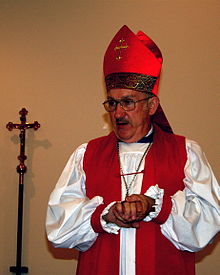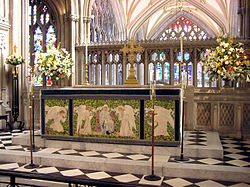United Episcopal Church of North America
| United Episcopal Church of North America | |
|---|---|
| File:UECNAlogoNB.gif The UECNA crest. | |
| Classification | Continuing Anglican |
| Orientation | Anglo-Catholic to Evangelical |
| Polity | Episcopal, (with Apostolic Succession) |
| Moderator | Stephen C. Reber, Archbishop |
| Leader | Stephen C. Reber, Wes Nolden, Sam Seamans, Peter D. Robinson |
| Associations | Inter-Communion with Anglican Catholic Church and the Anglican Province of Christ the King |
| Region | United States |
| Founder | Charles D.D. Doren |
| Origin | 1981 Pittsburgh, Pennsylvania |
| Separated from | Anglican Catholic Church |
| Congregations | 24 parishes and missions [1] |
| http://www.united-episcopal.org/ | |
The United Episcopal Church of North America (UECNA) is a traditional Anglican Christian church that is part of the Continuing Anglican movement. Currently the Anglican Catholic Church, Anglican Province of Christ the King and the UECNA are seeking organic unity.
The UECNA describes itself as orthodox, catholic and evangelical in scope, "embracing the broad base of ceremonial practice inherent in the Historic Anglican Communion - The Anglican Catholic Episcopal Tradition." The UECNA uses the 1928 Book of Common Prayer.
The changes in the mainline denominations that it and other continuing churches object to include the acceptance of abortion rights, broadened definitions of marital relationships, the ordination of women, and changes to the theology of the Book of Common Prayer. They now also object to the ordination of openly homosexual clergy.
The UECNA does not consider itself to be a Protestant denomination or part of the American fundamentalist movement, but rather a continuation of the ancient Christian church.
History
Main article: History of the Church of England See also: English Reformation
Founding of the UECNA
Bishop Charles D. D. Doren is considered the founder of the UECNA. The church was established in 1981 after he and three parishes left the Anglican Catholic Church (ACC) to create the UECNA as a home for Anglicans of the Low Church tradition. Today the UECNA has reconciled with the ACC and, as of 2007, has an intercommunion agreement with the ACC. [2]
There are 23 UECNA parishes in 11 states including: Alabama, Arizona, Arkansas, Florida, Indiana, Maryland, Missouri, North Carolina, Ohio, Virginia, and Wisconsin. [1]
Convention of 2008
At the UECNA's ninth triennial convention the clergy and delegates elected three suffragan bishops: Father Peter Robinson, Father Sam Seamans and Father Wes Nolden who will serve the church and also assist the ACC and APCK when requested to provide episcopal ministry to their parishes.
The delegates also elected the national council and a vice-chancellor. Bishop Presley Hutchens of the ACC addressed a banquet and discussed uniting the ACC and UECNA. Presiding Bishop Reber encouraged everyone, especially the clergy, to speak the truth and not mind the consequences. He further encouraged everyone to call people to repentance for sin at a time when the current trend is to disavow the existence of sin. [3]
Apostolic succession
The UECNA traces its apostolic succession as follows: Bishop Samuel Seabury was consecrated by three Scottish "non-juror" Bishops named Kilgour, Petrie And Skinner in 1784 at Aberdeen, Scotland. Later William White and Samuel Provoost became the first bishops of Pennsylvania and New York. They were consecrated in London in 1787 by Archbishop J. Moore. So the line is traced from:
- Samuel Seabury, William White the First Bishop Of Pennsylvania (PECUSA), and Samuel Provoost to
- Philander Chase (PECUSA) to
- Henry Whitehouse (PECUSA) to
- George Seynour (PECUSA) to
- Edward Osborne (PECUSA) to
- Granville Sherwood (PECUSA) to
- John White (PECUSA) to
- Richard Loring (PECUSA) to
- Charles Clough (PECUSA) to
- Albert Chambers (PECUSA) to
- Charles David Dale Doren - first bishop of the UECNA to
- Albion Knight, Jr. (UECNA) to [citation needed]
- John C. Gramley (UECNA) to
- Stephen C. Reber, Sr. (UECNA)
Intercommunion agreements
See: Anglicanism
The UECNA has effected intercommunion agreements with a number of other Continuing Anglican churches. Those presently in effect are with:
The UECNA recently ended its intercommunion arrangement with the Anglican Province of America, citing the APA's signing of a similar agreement with the Reformed Episcopal Church.
Past leaders

- Bishop C. David Dale Doren
- Bishop Albion Knight
- Bishop John C. Gramley
Current leaders
- Archbishop Stephen C. Reber Grace Chapel, Statesville, North Carolina
- Bishop Wes Nolden
- Bishop Peter D. Robinson
- Bishop Sam Seamans - St. Thomas Anglican Church
- Archdeacon George E. McClellan
- Archdeacon David Straw
National Council
The National Council is composed of the archbishop and ten members chosen from the clergy and laity.
Doctrine
Main article: Anglican doctrine

According to the Most Reverend Stephen C. Reber, the UECNA's archbishop:
"As Anglicans, we then accept the components of the faith revealed; the Scriptures, Creeds, Councils, Sacraments, Worship, Ministry, and Tradition. We believe that all of the components are like strands of a rope; a unity which holds the church together. In this belief we share a Catholic ideal way of faith.
The Reformation of the 16th century was the most comprehensive and far reaching effect to return the Christian faith to its legitimate roots of faith and practice. We accept the English Reformation as that which diligently sought the true sources of faith and discredited the many corruptions and distortions of the Middle Ages. Actually, the Articles of Religion found in the Prayer Book were written not as a statement of faith, but to deal with the above mentioned distortions and corruptions of the medieval church.
We do not, however, accept the theology of the Continental Reformation or its uncatholic effort which tried to discard the fundamental principles of the historic faith along with the abuses. We do not accept private innovations intruding into the Church’s teachings. We honor Luther, Calvin, Knox and others for their efforts to explain the faith, but do not accept them as having prophetic abilities to speak for God."
Explaining the UECNA's view of itself and its mission, the statement continues:
"We do believe God has given us a special position as a “bridge church” — a bridge between Roman Catholicism and Protestantism.
We proclaim a living way of faith and worship that believes in every persons right to life, honor traditional marriage between a man a woman and practice financial policies that allow local ownership of local property (Church, parish house, etc). The United Episcopal Church of North America, while coming from the American arm of the Anglican Communion and having our apostolic succession from these bodies, does not belong to either of these organizations nor shares their extreme liberal views on morals and their abandonment of orthodoxy.
We are a church truly catholic and evangelical in scope and embrace a broad base of ceremonial practice inherent in the Historic Anglican Tradition."[5]
Departures from The Episcopal Church
See: Recent controversies in the ECUSA

While the UECNA and The Episcopal Church share some doctrines, practices and core beliefs, the UECNA departs from some modern teachings of the the Episcopal Church.
The UECNA particularly condemns:
- the Episcopal Church's acceptance of abortion;[6]
- the influence of liberal theology and certain aspects of liberation theology;
- the Episcopal Church's alterations in the theology of the traditional Book of Common Prayer (The UECNA rejects the 1979 version);
- the Episcopal Church's participation in political movements where free people are denied the right or ability to defend themselves against tyrants;
- the Episcopal Church's acceptance of ordained practicing homosexuals and/or women to the priesthood and office of the bishops, although the UECNA believes that all should be loved. The UECNA does actively encourage women to participate in the church through the vestry and as parishioners. Both men and women are eligible to become professed members in the UECNA's religious order, the Order of St Benedict.
Ordination and lay leadership
See: Episcopal polity
The UECNA's leadership is divided among lay leaders and ordained ministers as follows:
Ordained levels

Those in ordained positions (including students admitted to postulancy) include the following: [7]:
- Postulant - Is a student for Holy orders, and is not yet ordained. A postulant must complete not less than one year of study consisting of Church History, Pastoral Work, Liturgics, Doctrine and Holy Scripture. He assists the local parish as a layreader in the offices of the church as called upon and allowed by the canons of the church.
- Deacon - There are two types of deacons: perpetual and transitional. A transitional deacon is training for priesthood. Both serve at the pleasure of the Presiding Bishop. A transitional deacon can be called to assist other priests in the parish. Before priesthood the deacon must serve for not less than one year and complete a course of study.
- Priest - "The priest will take part in community activities and will actively evangelize the un-churched or the lost to become an active part of the Body of Christ."
- Bishop - Bishops are "assigned a Diocese consisting of a given number of parishes, and will provide regular oversight, counsel and guidance to those parishes. An Episcopal visit to each parish will be made not less than once a year and attendance at national counsels and meetings as called."
Lay leadership positions
- Lay Reader - A competent layman licensed by a bishop of the Church to read some parts of a service of worship.
- Warden - An Officer of the Vestry (parish council)
United Episcopal Church Women
The UECW is an official organization of women who serve the church.
Order of St. Benedict
See also: Order of St. Benedict (Anglican)
The church recognizes one monastic order, which is named the Order of St. Benedict. [8] The order uses a modified version of the Rule of St. Benedict.[9]
Membership is open to married or single men and women over the age of 21 who are convicted that they are called to the religious life.
The order has no established communities and does not establish communities. Instead, "[m]embers provide for their own living quarters and obtain their livelihood through secular or religious employment"
The stages of development are:
- Postulant - one who has made application to the abbot, been accepted to the order, and awaits investiture as a novice.
- Novice - one who vows to a testing period of one year. These vows are taken in the presence of the abbot, or a priest appointed by the abbot.
- Professed Member - one who takes final vows of the order. These vows are taken in the presence of the Abbot.
Publications
- Glad Tidings, News and Events from the UECNA.
See also
References
- ^ a b UECNA Parishes
- ^ Excerpts from the website of the UECNA
- ^ http://www.youtube.com/watch?v=9ViHz7oPK60&NR=1 Youtube video of the Convention
- ^ http://www.anglicancatholic.org/acc-uec.html
- ^ Excerpt from the webpages of the UECNA, "About us" section
- ^ Episcopal Church Resolution 1994-A054 on abortion
- ^ UECNA ordination guide on-line
- ^ http://united-episcopal.org/anglican-osb/rule.html
- ^ Order of St. Benedict
